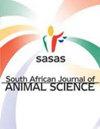MC4R基因多态性对埃及两种家兔生长效率分类和胴体测量的影响
IF 0.6
4区 农林科学
Q3 AGRICULTURE, DAIRY & ANIMAL SCIENCE
引用次数: 0
摘要
黑素皮质素4受体(Melanocortin 4 receptor, MC4R)是一种源自MC4R基因的蛋白质,参与人体采食量、代谢控制和体重调节。本研究的目的是探讨MC4R多态性与代谢标志物的变化及其与家兔生长和胴体测量的关系。采用合成V系(V-line)和Baladi黑兔品种(每个品种60只),采集血样进行DNA提取和生化分析。聚合酶链反应(PCR)产物MC4R (493 bp)显示5个非同义单核苷酸多态性(SNPs;已提交给GenBank,编号为gb|MT832144|、gb|MT832145|、gb|MT832146|)。4个snp是v系品种的特征,1个是巴拉迪黑的特征。对于品种内部和品种之间定义的snp依赖群体的分类,判别分析模型使用以下预测变量正确分类了一定百分比的病例:5-14周龄体重90.8%;采食量、日采食量、饲料系数均为85%;胴体测量的预测率为93.3%(其中后躯重量、肝脏重量和肝脏百分比是两个品种的最佳预测指标)。在代谢生化标记谱和定义的单核苷酸多态性上,v系和巴拉迪黑品种之间和内部存在显著差异。鉴定的MC4R基因snp和代谢生物标志物图谱可作为有效鉴定两种家兔品种的候选和参考。因此,这项研究可以促进对家兔生长性能特征的标记辅助选择的引入。本文章由计算机程序翻译,如有差异,请以英文原文为准。
MC4R gene polymorphisms for classification of growth efficiency and carcass measurements in two rabbit breeds in Egypt
Melanocortin 4 receptor (MC4R), a protein derived from the MC4R gene, is involved in feed intake, metabolism control, and body weight regulation in humans. The purpose of this research was to explore MC4R polymorphisms alongside metabolic marker changes and their relationship with growth and carcass measurements in rabbits. Using synthetic line V (V-line) and Baladi Black rabbit breeds (60 rabbits per breed), blood samples were collected for DNA extraction and biochemical analysis. The polymerase chain reaction (PCR) product of MC4R (493 bp) revealed five nonsynonymous single nucleotide polymorphisms (SNPs; submitted to GenBank with accession numbers gb|MT832144|, gb|MT832145|, and gb|MT832146|). Four SNPs were characteristic of the V-line breed, and one was characteristic of the Baladi Black. For classification of the defined SNP-dependent groups within and between breeds, a discriminant analysis model correctly classified a percentage of cases with the following predictor variables: 90.8% for body weight at 5–14 weeks of age; 85% for feed consumption, daily feed intake, and feed conversion ratio; and 93.3% for carcass measurements (for which hind part weight, liver weight, and liver percentage were the best predictors in both breeds). There were significant differences between and within V-line and Baladi Black breeds in agreement with metabolic biochemical marker profiles and the defined SNPs. The identified SNPs in the MC4R gene and profile of the investigated metabolic biomarkers could be used as candidates and reference for the effective characterization of the two rabbit breeds. This study could therefore facilitate the introduction of markerassisted selection for growth performance characteristics in rabbits.
求助全文
通过发布文献求助,成功后即可免费获取论文全文。
去求助
来源期刊

South African Journal of Animal Science
农林科学-奶制品与动物科学
CiteScore
1.50
自引率
0.00%
发文量
39
审稿时长
>36 weeks
期刊介绍:
The South African Journal of Animal Science is an open access, peer-reviewed journal for
publication of original scientific articles and reviews in the field of animal science. The journal
publishes reports of research dealing with production of farmed animal species (cattle, sheep,
goats, pigs, horses, poultry and ostriches), as well as pertinent aspects of research on aquatic
and wildlife species. Disciplines covered nutrition, genetics, physiology, and production
systems. Systematic research on animal products, behaviour, and welfare are also invited.
Rigorous testing of well-specified hypotheses is expected.
 求助内容:
求助内容: 应助结果提醒方式:
应助结果提醒方式:


